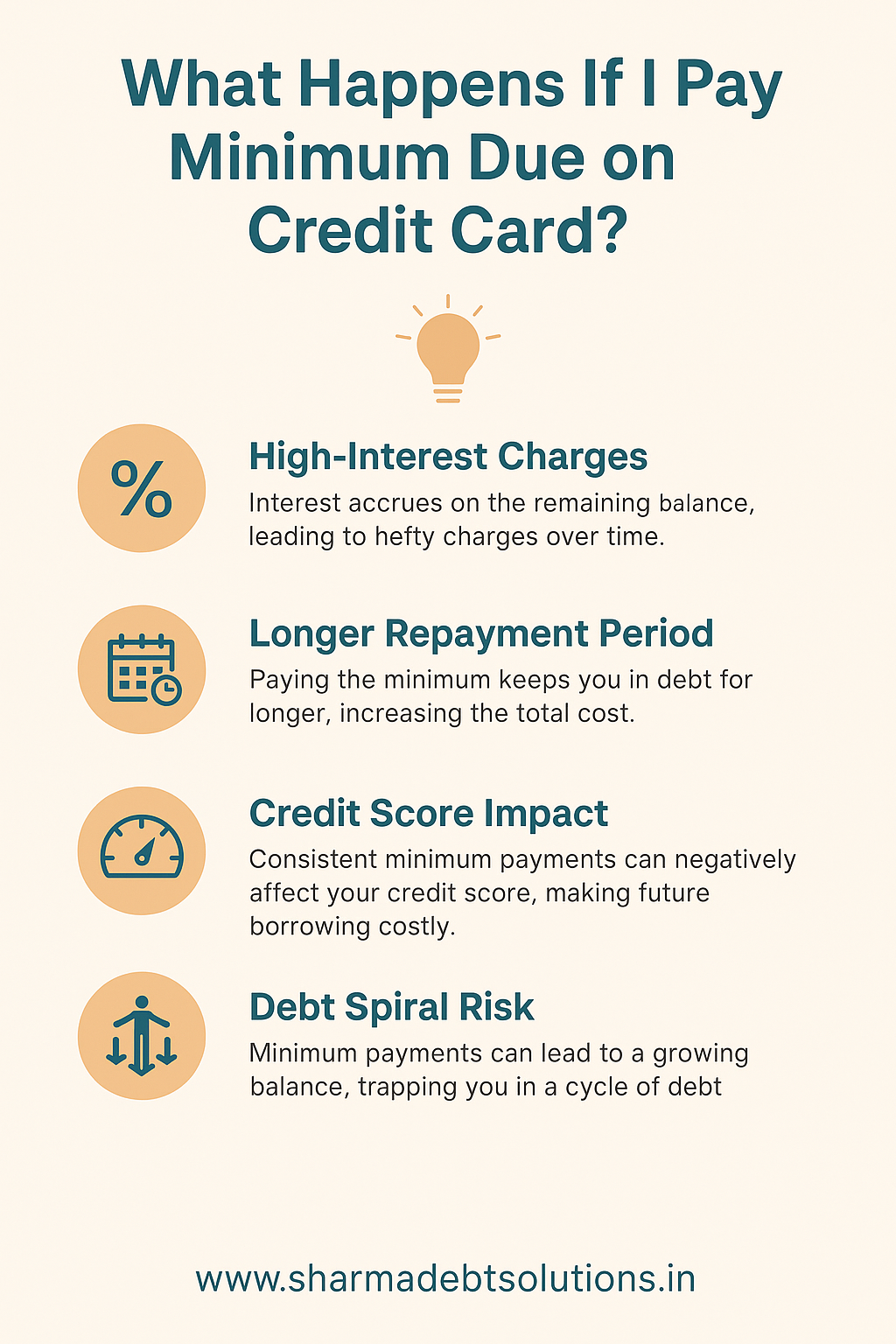So, what happens if I pay minimum due on credit card? Let’s break it down in simple words.
We’ve all been there. The credit card bill arrives, your eyes pop out looking at the total outstanding, and then you spot a smaller, seemingly harmless number: “Minimum Due.” Relief washes over you — “Great, I’ll just pay this and be safe.”
But is it really that safe? Or is it the start of a financial trap that banks don’t talk about openly?
In this article, I’ll break down what happens if I pay minimum due on credit card in India — the truth, the hidden charges, and most importantly, how you can escape the debt trap. Think of this as your no-nonsense guide (Harsh Agarwal style) to understanding the game banks play.
What Does “Minimum Due” on a Credit Card Mean?
The minimum due is usually 5% of your total outstanding balance (or a fixed amount like ₹200–₹500, whichever is higher).
So, if your bill is ₹50,000, your minimum due may be just ₹2,500. Tempting, right? Banks market it as a “convenient way to manage payments.”
But here’s the catch: Paying only the minimum doesn’t clear your balance. It just keeps you from being marked as a defaulter for that billing cycle.
Most people don’t realize that when they ask what happens if I pay minimum due on credit card, the real answer is endless interest charges.
For more details, you can check the official RBI credit card guidelines which explain how card payments and dues are structured.
What Happens If I Pay Minimum Due on Credit Card?

1. Interest Charges Keep Adding Up
If you pay only the minimum due, the remaining balance starts accruing interest. In India, credit card interest rates usually range between 30%–45% annually. That’s like loan-shark territory!
2. The Debt Snowball Effect
Let’s say you have ₹50,000 outstanding and you only pay ₹2,500. The next month, interest is added on the unpaid ₹47,500. Plus, your next month’s expenses. This cycle snowballs into a massive debt over time.
3. You Lose the Interest-Free Period
Normally, if you pay your bill in full, you get up to 45–50 days of interest-free credit. But once you start paying only minimum dues, interest kicks in from Day 1 on new purchases. Basically, your card becomes a super-expensive loan machine.
4. Your Credit Score Takes a Hit
While paying the minimum avoids a “default” tag, over time, high utilization + rolling balances hurt your CIBIL score. Banks see you as risky, which makes future loans harder to get.
5. Late Fees May Still Apply
If you miss even the minimum due, late fees + GST get slapped on top. Paying only minimum keeps those away temporarily, but interest is silently draining your money.
Example: Minimum Due Trap in Action
Imagine this:
- Bill = ₹50,000
- Minimum Due = ₹2,500
- Interest rate = 36% p.a. (3% per month)
If you only pay minimums, your ₹50,000 can take years to clear, and you might end up paying ₹1 lakh+ in interest alone. That’s the trap.
Banks don’t mind — in fact, they love it. You’re their perfect customer if you keep paying minimum due forever.
Why Banks Push the Minimum Due Option
- Keeps you hooked – You feel safe because you’re “not a defaulter.”
- Max profit for banks – Interest + GST + late fees = jackpot.
- Psychological trick – That small number looks achievable, so you delay facing reality.
It’s not your fault. The system is designed to nudge you into this pattern.
How to Break Free from the Minimum Due Cycle
1. Stop Using the Card Temporarily
First, stop adding fuel to the fire. No more swipes until you’re out of debt.
2. Pay More Than the Minimum Due
Even if you can’t pay in full, pay as much as possible. Target the highest interest card first.
3. Negotiate with the Bank
If you’re stuck, reach out to the bank. Sometimes, they offer conversion into EMIs at lower rates.
4. Consider a Balance Transfer
Shift your balance to another card with lower or 0% intro interest offers (if available). This buys breathing room.
5. Go for Debt Settlement or Professional Help
If things are out of control, credit card settlement consultants can step in. They negotiate with banks to reduce your outstanding legally and help you close the account with a fair settlement.
My Take: Should You Ever Pay Only Minimum Due?
Short answer: No.
Longer answer: Pay minimum due only if you’re in a temporary cash crunch and you’ll pay full next month. Never make it a habit. It’s like surviving on fast food — works in emergencies, but kills you if you live on it.
Frequently Asked Questions
What happens if I always pay only the minimum due on my credit card?
Does paying minimum due affect my CIBIL score?
How much is the minimum due in India?
Can I go to jail for paying only the minimum due?
What’s the smart way to use credit cards in India?
Final Thoughts
Paying only the minimum due on your credit card may look like a relief, but in reality, it’s the start of a debt trap. In India, with high interest rates, this can cripple your finances faster than you think.
If you’re already stuck in this cycle, don’t panic. Take action: pay more than the minimum, negotiate with banks, or seek professional help. Remember, banks want you to stay in debt — but you don’t have to play their game.
Want to explore safe ways to get out of the minimum due cycle? Contact us for credit card settlement consultation today.